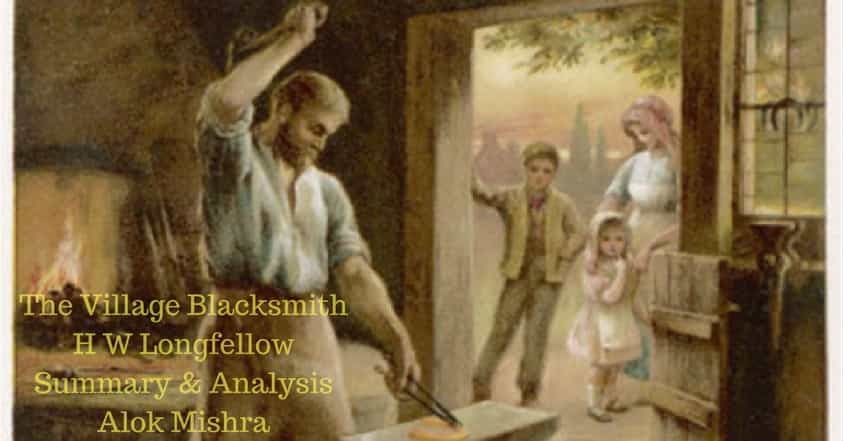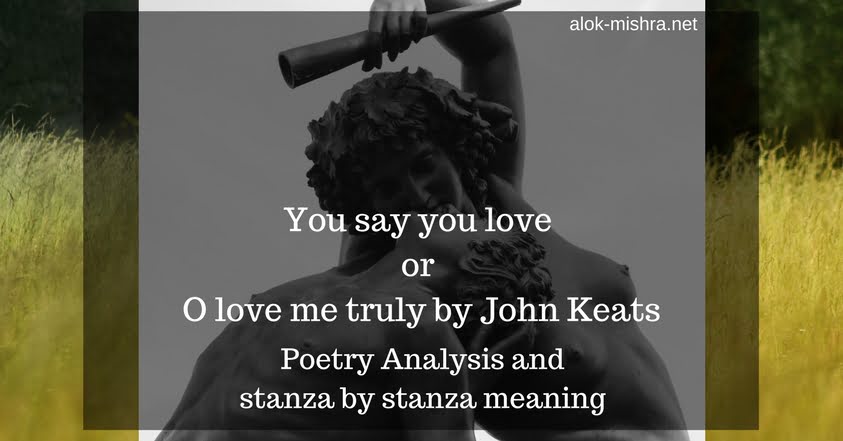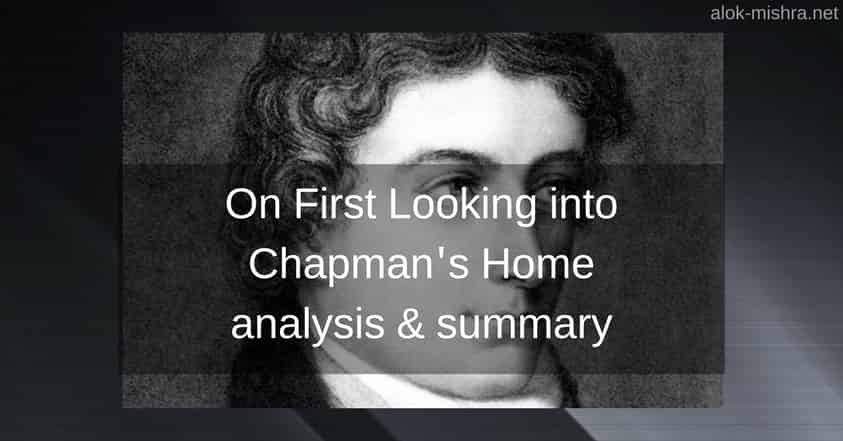"You say you love; but with a voice" is a love poem by John Keats…
The Village Blacksmith: Poem Analysis & Summary
I am a huge fan of Henry Wadsworth Longfellow outside the ambit of the literary circle and a great admirer of him within it. He is a poet who acts often as a preacher always telling us which way to go in life. If you are a Christian, you must have read the Psalms in The Holy Bible. However, if you are a student of literature, you must have read the Psalms of Life by this great poet Longfellow. One is religion and morality and another is, to a very great extent, no lesser than that! And today, I am taking some time out of my busy schedule to write for kids – the kids of secondary and higher secondary classes who have to study one of the finest poems of Longfellow – The Village Blacksmith. I will be writing the summary as well as detailed analysis of the poem so that the students might follow what the great poet tried to hint through his poem. So, let’s study Henry Wadsworth Longfellow’s The Village Blacksmith!

Under a spreading chestnut-tree
The village smithy stands;
The smith, a mighty man is he,
With large and sinewy hands;
And the muscles of his brawny arms
Are strong as iron bands.
Meaning and Details: These lines mean what you are seeing in the lines. The poet talks about a person, the blacksmith of course, who is strong and he is standing under the chestnut tree. His hands are stronger than usual and the poet uses a simile to compare his hands to iron bands in the last line.
His hair is crisp, and black, and long,
His face is like the tan;
His brow is wet with honest sweat,
He earns whate’er he can,
And looks the whole world in the face,
For he owes not any man.
Meaning and Details: In the second stanza, Longfellow gives us a further description of the person (blacksmith). He tells us that the blacksmith has long, black and crisp hairs. The next thing is his face which is tan (brownish). After the first two lines, the next four lines are very important with respect to the meanings and connotations. The blacksmith’s brow is wet with ‘honest sweat’ and he earns only what he can. The poet is hinting at the ‘honesty’ and ‘satisfaction’ of the blacksmith. He does not borrow from anyone because he earns as per his capacity and does not demand more. He is not greedy! And a person who does not owe to anyone can live a life happy and glee! The expression ‘looks the whole world in the face’ means to tell the readers that a person who is honest, not greedy and does not borrow unnecessarily (or not at all) can be equal with everyone in the terms of treatment. He won’t need to flatter someone!
Week in, week out, from morn till night,
You can hear his bellows blow;
You can hear him swing his heavy sledge,
With measured beat and slow,
Like a sexton ringing the village bell,
When the evening sun is low.
Meaning and Details: These lines are all praise for the blacksmith’s labour that he does from the morning to the evening until the sun sets. The sounds of his sledge sound like the village bell. A person can always hear his bellows (the set-up to heat the iron to be able to forge it). And this goes on every day…
And children coming home from school
Look in at the open door;
They love to see the flaming forge,
And hear the bellows roar,
And catch the burning sparks that fly
Like chaff from a threshing-floor.
Meaning and Details: In this stanza, Longfellow tells the readers about the school children who (out of curiosity and admiration) love to see the blacksmith’s work through the door which remains open. Children love to see the bellows which produce sounds like roaring. Children also love to see the sparks which keep flying and produce a scene like the flying husks during the threshing procedure.
He goes on Sunday to the church,
And sits among his boys;
He hears the parson pray and preach,
He hears his daughter’s voice,
Singing in the village choir,
And it makes his heart rejoice.
Meaning and Details: In this stanza, the poet is relaxed and he is telling us about the soft side in the heart of this strong blacksmith who goes to attend church every Sunday with his family. The blacksmith hears carefully the preacher’s message; he listens to the prayer with joy and also loves to listen to his daughter’s voice who plays in the village choir. And all this Sunday episode, the poet says, makes the blacksmith happy and satisfied!
It sounds to him like her mother’s voice,
Singing in Paradise!
He needs must think of her once more,
How in the grave she lies;
And with his hard, rough hand he wipes
A tear out of his eyes.
Meaning and Details: The poet continues the stanza from where he left off in the last one. Longfellow tells us that the Blacksmith feels that the voice of his daughter is just like her mother – his wife (who has died) as if she is singing in the heaven. The blacksmith thinks about his wife in the grave and tears flow out of his eyes. He wipes the tears with his ‘hard and rough’ hands. In these lines, the poet seems to suggest that the outlook of the blacksmith is hardened but he owns a soft heart which has emotions!
Toiling,–rejoicing,–sorrowing,
Onward through life he goes;
Each morning sees some task begin,
Each evening sees it close
Something attempted, something done,
Has earned a night’s repose.
Meaning and Details: This stanza and the last one after it are very important. As I told earlier, Longfellow is a person who is a poet as well as a preacher who always tends to tell us the right path to go ahead. The blacksmith becomes his vehicle in this poem to tell us what should be the ‘structure’ of a happy and satisfied life. The blacksmith spends his life working hard, being happy and being sad at times. He keeps moving ahead in his life as each morning he starts something new and ends it with the evening. Every day he works and every night he rests fully. The hard work he does in the morning gives him a sleep of calm at night. The blacksmith, to the poet, is an ideal person!
Thanks, thanks to thee, my worthy friend,
For the lesson thou hast taught!
Thus at the flaming forge of life
Our fortunes must be wrought;
Thus on its sounding anvil shaped
Each burning deed and thought.
Meaning and Details: And this is the last stanza of the poem which by all means is the most important one. The poet thanks the blacksmith for the ‘lesson’ that he has taught to the poet (and then the poet taught to the readers). Longfellow tells that we should also learn the lesson of hard work from the village blacksmith and never shy away from determination and labour which will eventually build our fortunes. This world is just like the anvil on which we have to shape our deeds and thoughts to make ourselves a better person day by day…
Conclusion: The poem The Village Blacksmith is a beautiful, purposeful, insightful and meaningful poem. It tells us about the life of a blacksmith who becomes the metaphor for a purposeful life. We must learn from him – his hard work and satisfaction. We can always make our lives happy; we can always make ourselves stronger!
And to all those who are appearing in the examination, very best wishes! Do your best and make yourself proud!
(thanks to James who pointed out a crucial mistake in my writing which could just change the entire meaning)
1.
The Village Blacksmith: Poem Analysis & Summary




Nice summary
Excellent! It’s really good and helpful
i wonder how large his sledge was
Thanks for the summary nicely explained this helped me a lot….God bless you
ok
Thank you sir . For such a help, as now I am not in doubt or confused of any line of the poem ‘The Village Blacksmith’ . So for that the stanzas which may come in exam can be solved by me very easily.
Once again thank you so much.
Please stay safe……….
Thanks Alok Mishra it’s help full for me
Thank you so much Sir..Wish me luck as I have an exam tomorrow..Thank you!!§§
I HAVE MY FINAL EXAM ON THIS TAKS FOR YOUR HELP
Very nicely explained
thank you sooooo much for your incredible explanation.it really helped me a lot
It was a wonderful explanation…Just there was a little mistake in the first stanza’s explanation…The last 2 lines of the first stanza stated that THE MUSCLES OF HIS ARMS ARE AS STRONG AS IRON BANDS…You had written that his hands are being compared but actually the muscles were be compared with the iron bands…Otherwise, a JAI MATA DI LET’S ROCK explanation
Thank you for your version of the explanation, Anushka! I just thought the muscles of his arms and hands as a whole. Take care and do your best!
Amazing , it’s very helpful…..Thankyou!!!!!
thanks for such a wonderful explanation . Now i am well prepared for my exam thanks a lot
Very easy explanation…thank you for writing such big and best explanation…thank u for ur time in writing btw my paper is tomorrow…will make u proud
It was a good explanation. Very simple for the students. Keep it up. Well done. I am a retired english teacher in kerala.
Hi, Mary! Many thanks for your appreciation. I am glad to get a teacher’s approval!
Thanks for your great dedication and explanation to this poem it helped me a lot in solving answers for my brother.
Explain flaming forge of life?
Can you tell me what is the theme of the poem :the village blacksmith.acc to you.
This is very helpful for me for understanding this poem. My exam will take place in 3 March 2020. I think it can be helpful for writing my exam. I am a student of grade 5.
All the best for your examination, Omair! I am glad it could be helpful and comprehensive to you. Do your best! The Village Blacksmith is a poem to relish and learn. You will enjoy the symphony; you will realise the agony.
Thanks it helped me so much for my exams
Thank you sir for the help. I have an exam tomorrow and I appreciate all your effort it is very easy to learn and understand the explanation of this poem
Hey Harshinee, all the best for your exams if any of them are left! I hope you had a good paper in English. Keep doing your best always.
Thank you sir for the help. I have an exam tomorrow and I really needed this THANKS ALOT
Thanku brother …its very helpful to me…reading this xplanation which is really very wonderfully written..helped me a lot..
I’m glad it could be helpful to you, Sneha! All the best for your examination! Do your best.
Thnks for such an amazing analysis…I learnt from here..and I hope that I will score good marks in my exm
I am a student of class 8.. This poem was there in our book.. And your analysis helped me a lot.. Thank you soo much for such an incredible analysis..
All the best for your studies, Ananya! I am glad that this poem analysis could be helpful to you.
Exclusive analysis! It has really proven extremely helpful and effective.
Hindi translation is surprisingly missing
Is the tear from the village blacksmith’s eye rolling out of grief?
Your article helped me a lot! Thank you very much!… I’m a budding writer and I really appreciate your analysis of the poem:)
Great to know that you are an aspiring writer, Ritu! All the best! I am glad my words could be useful once again. Cheers!
Hi Alok, Thanks for describing the poem in such a beautiful manner and depth…
Hey, Manisha! Thanks for your feedback and I hope it served the purpose! All the best!
Which of the five senses does the third stanza concentrate on ? List some examples
Hi Alok,
As you ve written that the village blacksmith stands under a chestnut tree…. I feel that it should be the blacksmith’s workshop and not the blacksmith who s standing under the tree
That’s what we call the beauty of poetry, Niharika! You can feel anything you want to and then try it to be settled in the flow of the poem and see whether that ‘feeling’ makes it to the end or not. Well, you are right that it’s the workplace under the tree but also the Smith himself because the poet describes him afterwards. 🙂
And the worker usually works at his workplace, doesn’t he?
Cheers!
Definitely this poem is all about the circle of how we take our existence of purpose seriously and the circumstances in which we learn to do hard work to live with honesty and within our limitations with pride and head held high. Our hard work will only be fruitful, when we’re continuously working towards completing our tasks with goodness and honesty. It is indeed a extremely beautiful poem. Lessons learned is vital to upgrade our spiritual growth of mind. Life’s ups and downs are a part it’s circle, how we get stronger to face its currents with determination and Positives, is the quality we must learn.
Thanks Alok, a lovely synopsis.
Would you be able to help me out with the tone of the poem?
The tone of the poem is appreciative. Longfellow is appreciating, telling the qualities and reminding the readers of the things we should learn from hardworking people.
What are the Themes of “The Village Blacksmith”?
Thank You
What is the meaning of worthy friend sir
Diya, ‘worthy friend’ is used to address the blacksmith by the poet.
I learn from it
Thank. You. Bhaiya. For.such awesome. Summaries
hey babyyyyyyyyyyyyyyyyyyyyyyyyyyyyyyyyyyyyyyy
Hey babes!
Baby still means baby when spelt babyyyyyyyyyyyyyyyyy, right? 🙂
It is very entusiastic synocsis
Fine explanation
Sir.. Please give the poem’s figures speech metaphor
Please give the poem’s figure of speech metaphor
I know who the name of the village blacksmith because he was a distant relative of mine. I’m visiting in Denmark now and was telling my cousins about it. I can’t remember his name but have it at home in Canada with a picture of The smithy and the names on an old photograph. I will send it to you ,if you’re interested, when I get home the end of September.
Dear Lynne, I will be more than enthusiastic to have that! Do send me and I am really glad to know that the blacksmith is known to you! Thanks
What is the mood in the poem
Dear Richard, the mood in the poem is appreciative – the poet is appreciating the character of a blacksmith whom he sees every day.
It reminds Blacksmith of her death wife’s voice … or his mother’s voice…which one sir..
Shaquib, it reminds the blacksmith of his daughter’s mother’s voice. If you read the poem, you will see: “It sounds to him like her mother’s voice,” and it qualifies to be his dead wife’s voice.
It reminds Blacksmith of her death wife’s voice …
Who was Longfellow writing about when he wrote The Village Blacksmith
Longfellow was writing about a blacksmith. It must have been a countryside area where the poet might have observed this blacksmith.
The summary and analysis is of great help.. I was to teach my daughter whose course includes this meaningful poem. Great work Alok ji !
I wish you and your daughter all the best, Rajkaran! Yes, Longfellow’s poem is very deep and meaningful.
Please give the poem’s figures of speech metaphor
A very helpful one
Thanks Amit Sir. It’s very much helpful for teaching 8th std students. I could not find the hidden beauty but summary by you made it possible for me.
Hi Aparna, many thanks for your comment! I am happy it could help you! However, Amit is my brother’s name and I am Alok. 🙂 You seem familiar to my family… haha
This is very helpful for me to slove my exams questions thank you very much for giving details of this .
Plzz write summary on lake isle of innisfree i need that one plzz
Thank you sir for ur help.
I have some questions regarding this poem. Please help in getting answers for them.
Q1. Describe the character of the village black smith. What do you like about him the most.?
Q2. He hears……. His eyes (stanzas 5 and 6) what is the poet trying to portray in these lines?
Thank you
When the black smith hearS. His daughters voice, it reminds him of her mother’s voice : not his mother.
This is the second analysis I have read recently in which this mistake occured.
It changes completely the meaning of the line.
Hi, James! The mistake has been corrected. Thanks for pointing it out. It is indeed his wife and her (his daughter’s) mother.